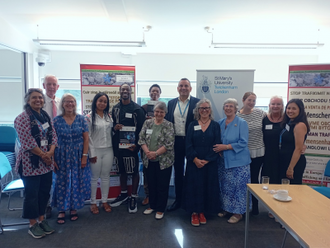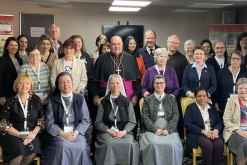RENATE launches report on 'Legal Practitioners' work with Victims of Human Trafficking'

Participants at Thursday's conference
On 4 July, Religious in Europe Networking Against Trafficking and Exploitation (RENATE) launched their research on 'Legal Practitioners' work with Victims of Human Trafficking' at the Bakhita Centre for Research on Slavery, Exploitation and Abuse, at St Mary's University, Twickenham,
RENATE Co-President Marie Power, HFB, warmly welcomed all who attended the event, in-person and online.
The research was a culmination of two year's collaborative work involving RENATE members in the five countries - Albania, Bulgaria, Romania, Spain and Great Britain - who fed in source information to Dr Carole Murphy, Director and Dr Ruth van Dyke, Acting Director of the Bakhita Centre, and Honorary Research Fellow, and Dr Anta Brachou, Post-Doctoral Researcher.
Amongst those present in person were David Ryall, Director, Santa Marta Group, who represented Cardinal Vincent Nichols, President and Chairperson of the Santa Marta Group and Imelda Poole, IBVM, former President of the RENATE Europe Network.
The context for the research came from the RENATE Europe Network's Mission Statement, which stated the need to challenge the judicial and civil authorities to adopt and enforce legislation that protects victims, provide them with adequate compensation, punish clients and buyers and seiz the assets of perpetrators.
Rich in data and direct quotations, the research findings are numerous, not least being the fact that those who are charged with legally supporting victims of human trafficking or modern slavery, very often do so with limited support themselves. Brian O' Toole who led the Law Task group said: ''The legal practitioners work in challenging conditions, where the work is slow, the caseload is high, training is largely absent and all for very little pay. In many cases lawyers quietly support victims long after their work obliges them to, such is the need and vulnerability that they have identified that they feel that to cease support would be tantamount to abandonment, even though there is no pay for this extra but necessary support. The work is neither attractive nor lucrative, but this report alerts us to, not only, the importance of those who take on this work but also the need for more to shoulder what is indeed a heavy burden.''
Another finding is the commitment, hard work, unstinting support - above and beyond what is expected, well beyond what the lawyers are being paid to do. The report is peppered with quotes that give a real sense of the difficulties experienced by legal practitioners. Frequently repeated by the lawyers in the research is the plea for a joined-up system that trains, resources, advocates and supports, always in the context of a 'victim-centred' perspective, as articulated by one lawyer: "It is not just survivors who are negatively impacted by limited legal aid capacity, it is also those practitioners who advise survivors. They have to manage heavy workloads and the pressure of being a key person in survivor's recovery journey. They also have to make decisions about who they can help. All of these generate stress."
One solicitor spoke of the fear and anxiety of working with these often very traumatic human trafficking cases - being so overworked, the worry of making a mistake, dropping the ball or missing something can be catastrophic for the victim.
Too many lawyers spoke of the complete absence of formal training on human trafficking. Others spoke of learning on the job, which they admit is not ideal, after all would you allow a doctor to treat you if s/he didn't have formal training and was just thinking on their feet? Some lawyers felt that this was the only way that they could operate.
In nearly all cases the lawyers spoke of poor fees, delayed payment, too many cases, complicated cases, time consuming cases and often necessarily so.
Ruth van Dyke, lead researcher for the research shared that when lawyers are being trained, they are very often shaped and moulded in such a way that their legal dealings with people are adversarial in nature but when a potential victim of human trafficking presents, there needs to an empathy, a patience, a willingness to wait until a relationship can be built up, a learned ability to listen deeply, non-judgementally with their whole being in order to be able to work with a sincerity for their new client. There is no training for this! In this report one lawyer puts it really well when he said:
What does it mean, victim-centred. In a very short sentence, I would say the victim is the leader of all our intervention. … the protagonist is the victim. So, all our services, all our information, all our goodwill has to build around the victim. How far can she go? How far can he go? I can see potentially some people I can help grow, unfold this potential (RIP1).
A lawyer's first advice may be around identification, this may then be supplemented with immigration advice, housing advice, or legal advice on family matters - after all perhaps this victim was trafficked by family members - who knows?
Sometimes victims are criminalised despite the guarantee that the non-punishment principle affords, and now the legal advice can take the form of criminal advice.
Whilst there is a lot of talk of compensation, yet another type of civil legal advice that a victim might need, there is very little success. Sometime the interest in a victim and the level of support offered by the state is contingent upon the successful conviction of a perpetrator. This support can melt away very quickly if prosecution looks unlikely.
Thus a case can quickly become very complicated and may require many different types of legal advice and all the time this is only exacerbated by the fear of the victim who is now reaching out to a lawyer and putting all their trust in them. The lawyers remind us constantly that it is precisely this trusting nature that has landed them where they are, hence one can feel how conflicted a victim might be. One particular quote from a Spanish Lawyer comes to mind when he said:
"Victims of human trafficking in most cases have been deceived by someone they trust a lot. So, they wouldn't invest the same trust in us. From the beginning the lack of trust, it's part of the first meetings.
Well okay, I trust you, but I [the victim] will keep a lot from you because I was hurt so much by someone I really trust my whole life ... So, I [the legal practitioner] think trust is built, it grows in relation to us by seeing visible concrete results. It can be very small ones. So, our responsibility as service providers, even legal providers, is to make sure that this trust is not broken by, let's say for example lack of coordination between low enforcement agencies and judicial assistance [around special measures like a screen in court] (RIP1)."
A component of the launch was a dialogue between Phil Brewer, MA, Honorary Research Fellow with the Bakhita Centre at St Mary's University, and Sousa Henkoma, who spoke from the lived experience of child criminal exploitation. Their dialogue emphasised the vital understanding of 'relationship' being key and confirmed the essential role which trust plays in all interactions between survivors and legal practitioners.
Communications was the central message from Dr Carole Murphy, reminding people to ''Listen, Listen, Listen… then people will talk,''
Lyndsey Cundall (UK) ATLEU training coordinator and legal practitioner, shared about expert-based training for legal practitioners during their formation. She offered practical insights into training and mentoring of legal practitioners, in addition to the demand unique to online training via Zoom and acknowledged the importance of collaboration and inter-dependency of the practitioners in sharing the wealth of information and experiences.
Cristina Puigdengolas Carrera from the Spanish NGO Diaconia, in speaking about the value of legal practitioners' work, reiterated the importance of building relationships through establishing trust and how crucial it is to actively listen to survivors and hear their story.
Milam Demnushaj, a lawyer working with the Albanian NGO Different and Equal, spoke about anti-matter law, Albania country-specific details and all the while emphasised the importance of standardised procedures for the identification of victims of Human Trafficking plus the need for unified legislative provisions across Europe. Standardised, unified Human Trafficking legislation not only ensures the efficacy of work for legal practitioners but ultimately is of assistance to the beneficiaries.
This report comes with clear country-specific recommendations as well as, well thought out recommendations for RENATE and the wider anti-trafficking movement, for next steps to advocate for the change that the legal practitioners are calling for but haven't the time to work for.
In conclusion, Anne Kelleher, Moderator for the launch congratulated all who contributed to the research and acknowledged the support of the Conrad Hilton Foundation who helped fund the research, continuing to show kind and generous support to all who work with and for victims of human trafficking.
Summarising the findings conveyed at this afternoon's launch, Anne said we have learned it is not only the Human Trafficking survivors who are negatively impacted, but also those who assist and advise survivors, as they seek to address the complex issues which those with the lived experience have to live with.
Those who presented at the launch brought those in attendance, on a journey through the variety and complexity of work involved for legal practitioners. The research exposes the reality of scarce and limited resources available to legal practitioners in terms of specialised training regarding human trafficking -essential if the legal profession is to keep abreast of the continuously evolving and complex nature of human trafficking.
The research highlights the lack of resources and funding to comprehensively support survivors and ensure countries honour their obligations under Art. 15 of the Council of Europe Convention on Action against Trafficking in Persons. It illustrates how legal practitioner's advice and work has much wider impact by seeking to enhance the knowledge of colleagues in addition to hold governments to account.
The research offers pathways forward as it provides insights to the models of training for legal practitioners.
Throughout, the research challenges us to think about how much more powerful and impactful we can be when we collaborate together.
Equally, the research emphasises the importance of standardised, unified Human Trafficking legislation for legal practitioners, in terms of not only the efficacy of legal counsel but ultimately for the aid of the beneficiaries, who must be front and centre of all our work. Added to which is the importance of standardised procedures for the identification of victims of human trafficking.
As expected, the research draws attention to the power and dangers of the online environment in the context of recruitment and exploitation.
Anne concluded the launch with a legal practitioner's quotation taken from the research:
''Specialised training of a practical nature is needed in order to provide tools that contribute to improved assistance to victims, with special emphasis on the need to act with a human rights and gender perspective, in coordination with different actors. Human trafficking cases are particularly complex and require a multidisciplinary approach (SSR5)''
and ''We need more specialist training if we want as many people as possible on board to fight human trafficking (SIP1).''
LINK
Read the report here: www.renate-europe.net


















